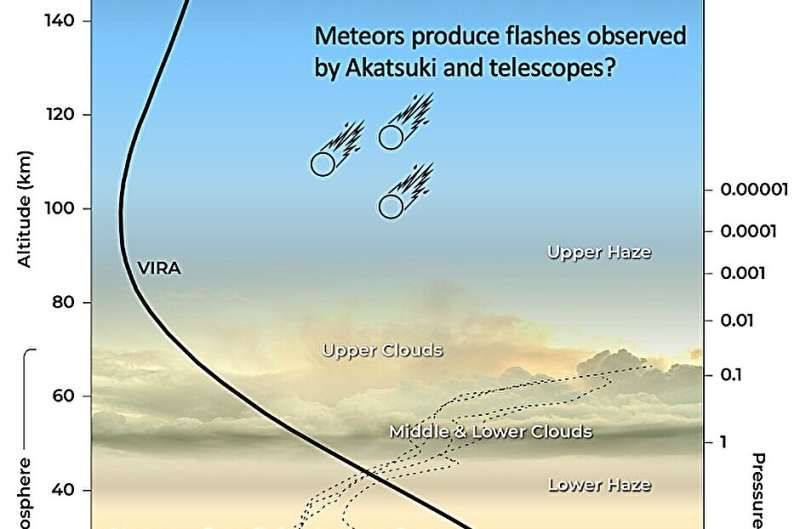September 12, 2023 report
This article has been reviewed according to Science X's editorial process and policies. Editors have highlighted the following attributes while ensuring the content's credibility:
fact-checked
peer-reviewed publication
trusted source
proofread
Flashes of light in Venusian atmosphere may be meteors, not lightning

A team of planetary scientists at Arizona State University has found evidence that the multitude of bright flashes in Venus' atmosphere may be due to meteors passing through, not lightning strikes. In their paper published in Journal of Geophysical Research: Planets, the group describes their study of the flashes of light and what they learned about them.
Scientists studying Venus have noted periodic flashes of light in its atmosphere for many years. For most of that time the flashes have been attributed to lightning flashing through the planet's atmosphere. Probes sent to the planet have done little to confirm the origin of the flashes—bursts of electromagnetic static have been recorded, which have been likened to the type heard during thunderstorms on Earth, suggesting lightning as a likely source.
But there has also been a sticking point—recorded bursts of static and images of a light flashing through the atmosphere have never been observed happening at the same time. Also, there is little evidence showing that Venus' atmosphere is capable of producing lightning. Such issues led the researchers on this new effort to consider another source—meteors.
To find out if meteors might be causing the flashes, the research team conducted two surveys of the flashing lights—one from data provided by the Mount Bigelow telescope in Arizona, the other from data collected by the Japanese Akatsuki orbiter.
The research team found that there were between 10,000 and 100,000 such flashes in any given year—numbers that might seem high for meteor strikes. But the researchers note that meteors lighting up the Venusian sky would be seen more often than is the case on Earth due to differences in the atmosphere and Venus' tighter orbit around the sun—meteors would travel more quickly through its atmosphere, leading to brighter flashes.
In comparing the number of flashes recorded in Venus' atmosphere with the number of possible meteor strikes, the team found them to be close enough to suggest that they could be related. More research is required, but if the initial findings turn out to be correct, space agencies will breathe a sigh of relief—sending a probe through clouds laden with lightning strikes is far more difficult than one where the skies are occasionally lit up by meteors.
More information: C. H. Blaske et al, Meteors May Masquerade as Lightning in the Atmosphere of Venus, Journal of Geophysical Research: Planets (2023). DOI: 10.1029/2023JE007914
Journal information: Journal of Geophysical Research: Planets
© 2023 Science X Network



















